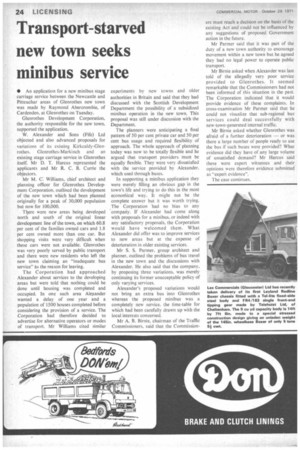Transport-starved new town seeks minibus service
Page 26

If you've noticed an error in this article please click here to report it so we can fix it.
• An application for a new minibus stage carriage service between the Newcastle and Pitteuchar areas of Glenrothes new town was made by Raymond Abercrombie, of Cardenden, at Glenrothes on Tuesday.
Glenrothes Development Corporation, the authority responsible for the new town, supported the application.
W. Alexander and Sons (Fife) Ltd objected and also advanced proposals for variations of its existing Kirkcaldy-Glenrothes. Glenrothes-Markinch and an existing stage carriage service in Glenrothes itself. Mr D. T. Harcus represented the applicants and Mr R. C. B. Currie the objectors.
Mr M. C Williams, chief architect and planning officer for Glenrothes Development Corporation. outlined the development of the new town which had been planned originally for a peak of 30,000 population but now for 100,000.
There were new areas being developed north and south of the original linear development line of the town, on which 60.8 per cent of the families owned cars and 1.8 per cent owned more than one car. But shopping visits were very difficult when these cars were not available. Glenrothes was very poorly served by public transport and there were new residents who left the new town claiming an "inadequate bus service" as the reason for leaving.
The Corporation had approached Alexander about services to the developing areas but were told that nothing could be done until housing was completed and occupied. In one such area Alexander wanted a delay of one year and a population of 1500 houses completed before considering the provision of a service. The Corporation had therefore decided to advertise for alternative operators or modes of transport. Mr Williams cited similar experiments by new towns and older authorities in Britain and said that they had discussed with the Scottish Development Department the possibility of a subsidized minibus operation in the new town. This proposal was still under discussion with the Department.
The planners were anticipating a final pattern of 50 per cent private car and 50 per cent bus usage and required flexibility of approach. The whole approach of planning today was now to be totally flexible and he argued that transport providers must be equally flexible. They were very dissatisfied with the service provided by Alexander, which used through buses.
In supporting a minibus application they were merely filling an obvious gap in the town's life and trying to do this in the most econoniical way. It might not be the complete answer but it was worth trying. s The Corporation had no bias to any company. If Alexander had come along with proposals for a minibus, or indeed with any satisfactory proposals, the Corporation would have welcomed them. What Alexander did offer was to improve services to new areas but at the expense of deterioration in older existing services.
Mr S. S. Parmer. group architect and planner, outlined the problems of bus travel in the new town and the discussions with Alexander. He also said that the company, by proposing three variations, was merely continuing its former unacceptable policy of only varying services.
Alexander's proposed variations would not bring an extra bus into Glenrothes whereas the proposed minibus was a completely new service, the time-table for which had been carefully drawn up with the local interests concerned.
Mr A. B. Birnie. chairman of the Traffic Commissioners, said that the Commission
ers must reach a decision on the basis of the existing Act and could not be influenced by any suggestions of proposed Government action in the future.
Mr Parmer said that it was part of the duty of a new town authority to encourage movement within a new town but he agreed they had no legal power to operate public transport.
Mr Birnie asked when Alexander was last told of the Allegedly very poor service provided to Glenrothes. It seemed remarkable that the Commissioners had not been informed of this situation in the past. The Corporation indicated that it would provide evidence of these complaints. In cross-examination Mr Parmer said that he could not visualize that sub-regional bus' services could deal successfully with new-town-generated internal traffic, Mr Birnie asked whether Glenrothes was afraid of a further deterioration — or was there a large number of people ready to use the bus if such buses were provided? What evidence did they have of any large volume of unsatisfied demand? Mr Harcus said these were expert witnesses and their, opinions were therefore evidence submitted as "expert evidence".
The case continues.












































































































































